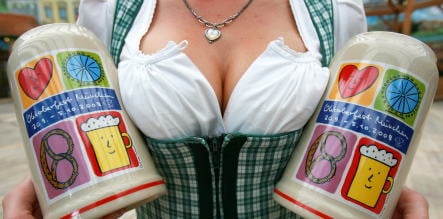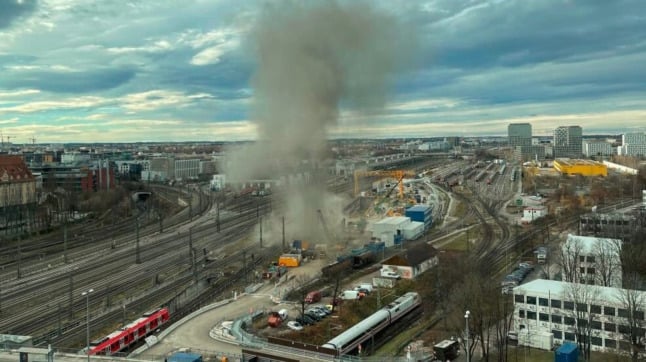An invitation arrived last week to enter the First Circle of Hell and naturally I am going to accept.
The Oktoberfest is the last great journalistic challenge. Despite being famous around the world, the Bavarian beer festival remains the strangest, most mysterious of German institutions.
How can the rogue state of Bavaria succeed in attracting over six million people to sit in pools of vomit? It is Europe’s biggest orgy and, despite the suspiciously large number of Munich babies born in June, one that is largely sexless.
The Australians and Americans consider it to be a centrepiece of their trip to old Europe. Even now the blogosphere is full of almost scholarly comparisons between Paulaner and Augustiner beer.
“Getting kinda sick of the Hofbräu-Zelt,” says one American fleeing to Munich from the land of Budweiser, the paint-stripper that poses as beer. “Let’s go for the Hippodrom,” comes a reply from another beer-refugee. “Really want to (over)indulge in Spatenbräu.”
Frankly, after the second Maß – a pitcher-sized mug for €8.50 – I don’t see how anyone can tell the difference. I have visited the Oktoberfest only once and remember only the little piles of male Japanese tourists, overcome by the great, though declining art of German brewing.
This year though promises to be different: I am heading for the Käfer tent, the Promi-ghetto which probably ranks, for these few days, as the most embarrassing zone in Germany. It is the place where whatever passes for glamour in German society – Boris Becker and actresses such as Veronica Ferres and Uschi Glas – rubs up against the Bierokratie, or the Beerocracy. And, of course, earn themselves a picture in society mag Bunte, securing their market value on Germany’s celebrity B-list. Usually someone in an expensively tailored Dirndl kicks off her shoes and dances on a table. It is an act of complete pointlessness and therefore oddly compelling.
I can’t wait.
This time though I have to be properly kitted out. You can slip into the Hofbräu tent in civilian clothes, but uniform is de rigueur at Käfers. Stupidly, I imagined that you could buy a good pair of Lederhosen at Franconia, the local hunting and shooting shop, because it sells green, leathery things to minor aristocrats with bloodlust. But real Oktoberfest Lederhosen apparently have to be bought at Angermeier in Munich.
What no one tells you about this curious apparel is that once you have levered your way into them, it is almost impossible to go to the toilet without spraying everywhere. As far as traditional garb goes, kilts are much better in this respect.
Why has this been a secret for so long? The combination of tight leather, heavy beer consumption and an unreliable bladder is a certain recipe for disaster.
Oktoberfest then promises to provide an interesting spectacle. Somehow the statistical output – 980 seated toilets, 878 metres of standing up facilities – does not reassure me.
I suppose I have been invited along because the English are legendary drinkers of warm, soup-like ale, and therefore unable to hold themselves steady when drinking the real, Bavarian brews. So, if conversation flags, you can always laugh at the dumb foreigner. This is a realistic calculation.
A scientific comparison of Anglo-German drinking behaviour showed that the English drank too fast in the initial phases, partly because of dehydration, partly because they underestimate the power of alcohol but also because they want to shed their chronic British embarrassment. When tipsy, the Englishman considers himself to be witty and a master seducer. Sadly, the phase between losing ones inhibitions and falling into a coma is a rather short one.
By contrast, the German drinker paces himself. The Bavarian does not need beer to loosen his tongue since, with or without alcohol, he remains incomprehensible. At the end though both British and German beer drinkers end up at the same destination: either asleep with their mouths attractively open, or in a police cell.
“Beer is so much more than a breakfast drink,” says a Bavarian sage. But the truth is that fewer people are drinking beer. The Oktoberfest is a last-ditch but ultimately doomed attempt to show that beer still rules the world. The revellers are coming to seem like a barley cult out of touch with the modern age. Perhaps they should set up an alco-pop tent on the Wies’n. That’s what the young want these days: sickly sweet vodka based drinks.
The venerable Oktoberfest will last a few more years yet, but it has swollen out of recognition. Foreigners – though not the Australians – are beginning to ask why so many Germans need to seek oblivion in order to be happy. I am going to see if I can find out.
If I can remember anything, I shall report back to you.



 Please whitelist us to continue reading.
Please whitelist us to continue reading.